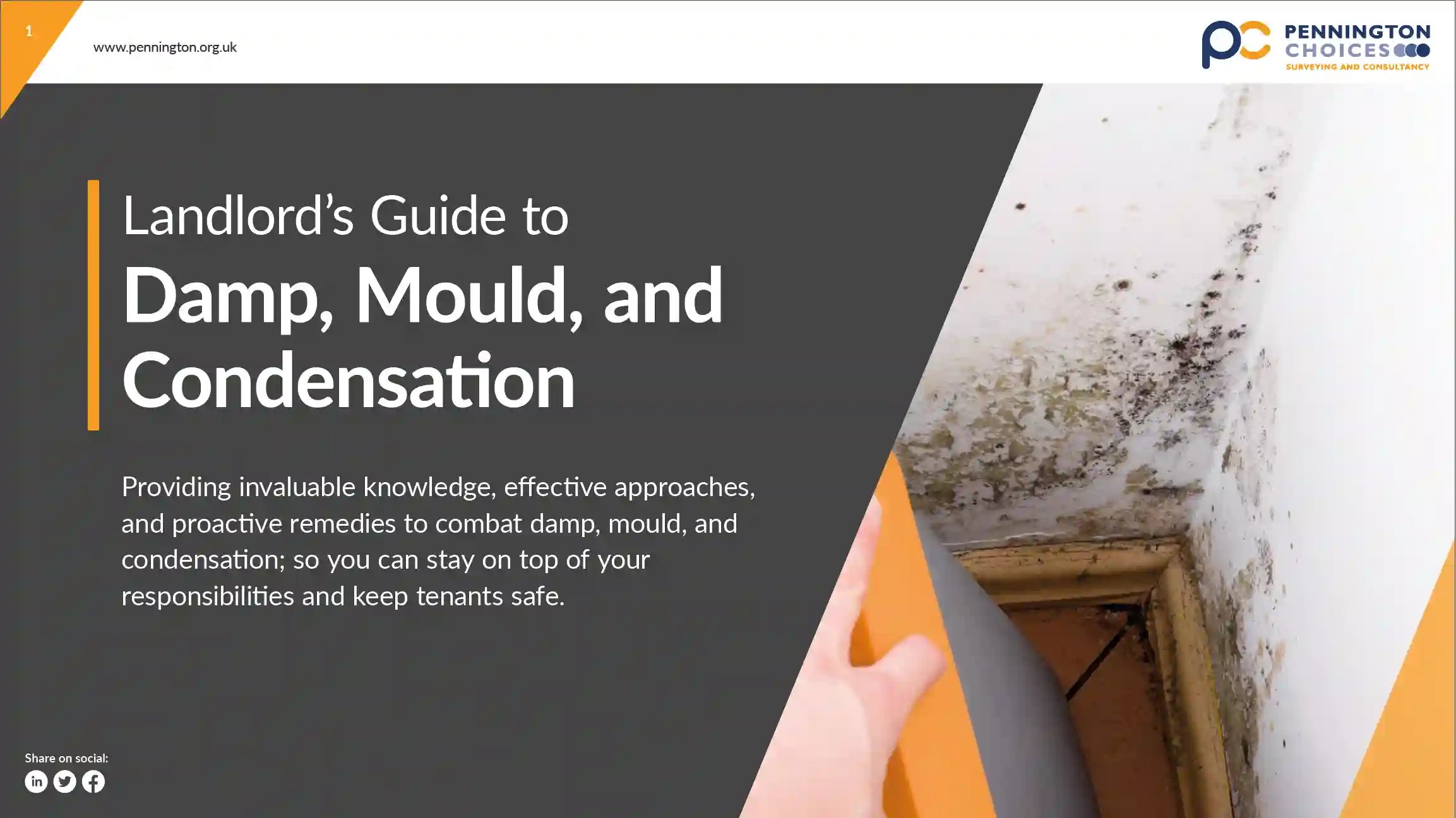Stay connected
When addressing persistent issues such as damp, mould, and condensation, it’s important for landlords to understand both your legal property compliance obligations and your tenants’ rights. Whilst there are certain duties and rights across all tenures, this blog will focus specifically on the rights of tenants in social housing and the implications of the newly approved Social Housing (Regulation) Act 2023 (the Act).
Landlords, do you have questions about what is on the horizon for damp and mould?
Find the answers to all your damp and mould questions in one place when you download your 'Landlords Guide to Damp, Mould, and Condensation' e-book.
Social Housing White Paper
The Act is delivering reforms outlined in the Social Housing White Paper – The Charter for Social Housing Residents, published in 2020, which followed on from the findings and proposals in the Social Housing Green Paper: A New Deal for Social Housing in 2017.
The government embarked on a ‘listening exercise’ following the Grenfell Tower fire in 2017 to engage with social housing residents to hear first hand about their concerns, and the measures outlined in the Green Paper included providing greater redress, better regulation, and improving the quality of social housing.
The White Paper set out a Charter for what every social housing tenant should be able to expect:
- To be safe in your home. The government will work with industry and landlords to ensure every home is safe and secure.
- To know how your landlord is performing, including on repairs, complaints and safety, and how it spends its money, so you can hold it to account.
- To have your complaints dealt with promptly and fairly, with access to a strong ombudsman who will give you swift and fair redress when needed.
- To be treated with respect, backed by a strong consumer regulator and improved consumer standards for tenants.
- To have your voice heard by your landlord, for example through regular meetings, scrutiny panels or being on its board. The government will provide access to help, if you want it, for you to learn new skills to ensure your landlord listens.
- To have a good quality home and neighbourhood to live in, with your landlord keeping your home in good repair.
- To be supported to take your first step to ownership, so it is a ladder to other opportunities, should your circumstances allow.
The coroner’s verdict in November 2022 into the death of Awaab Ishak reinforced the need for the government to implement the intended reforms, and to bolster these with additional measures to respond to the lessons from the inquest.
Since then the government has made a number of amendments to the Social Housing (Regulation) Bill which had been introduced to Parliament earlier in 2022, and has taken steps to educate and engage with tenants about their rights and how they can be empowered to raise concerns about the quality of their homes and services.
What does the Social Housing (Regulation) Act 2023 mean for tenants’ rights?
The Act was approved by Parliament and received Royal Assent in July 2023, and will reform the regulatory regime for social housing, in order to drive significant change in landlord behaviour. This will give tenants more power to hold their landlords to account for poor housing conditions and inadequate service delivery, with their rights strengthened through the new consumer regulation regime which will include additional enforcement powers for the Regulator of Social Housing.
- Regulator of Social Housing powers and duties
The Regulator will be given additional objectives for regulating social housing, including that it is safe and energy efficient, and ensuring registered providers act in a transparent manner with their tenants. The Regulator is also required to establish an Advisory Panel and this must include social housing tenants.
The Regulator has issued consultation on their proposed consumer standards which will respond to and implement some of the duties set out in the Act. The new consumer standards will place specific requirements on landlords, which they must comply with. The Regulator has already introduced Tenant Satisfaction Measures, which all providers must collect from 1st April 2023 and submit to the Regulator for the 2023/24 financial year from April next year. These include a range of indicators on how landlords are performing on property safety, condition and repair, as well as landlords asking tenants for their views on how their landlords are performing across a range of measures including repairs, listening and acting on their views, keeping them informed, treating them fairly and with respect, and how they handle complaints.
- Complying with health and safety duties
Registered providers will be required to designate a named person to act as their health and safety lead, to monitor their compliance with health and safety requirements. There will be specific duties on this person and the landlord if the landlord fails to comply with these requirements, and the person must have sufficient authority, capacity, and resources to carry out their role.
- Competence and conduct
The Act will enable the Regulator to set professional standard requirements relating to the competence and conduct of social housing managers, including that managers must obtain specific qualifications. This is intended to ensure social landlords employ managers who act professionally, understand their duties and responsibilities, and treat tenants with fairness and respect through the services they manage. Current proposals, which will be subject to consultation, are for ‘senior housing executives’ to have a foundation degree or level 5 qualification, and ‘senior housing managers’, such as neighbourhood housing managers, property managers, and assets managers, to have a level 4 qualification in housing management.
- Standards on information and transparency
In addition to the general powers and duties outlined above, the Regulator will be directed to issue an additional standard on information and transparency. This will include a strengthened requirement for landlords to offer tenants a range of meaningful opportunities to get involved in matters relating to their housing, and to consider tenants views when making decision about the management of their homes. This includes landlords providing tenants with opportunities to scrutinise their strategies, policies and services.
- Regulator enforcement of housing quality
The Act will provide the Regulator with more power to challenge landlords and protect tenants’ rights. The Regulator will have the power to conduct inspections with as little as 48 hours’ notice, reduced from 28 days, and to conduct emergency repairs if the home poses a health and safety risk to tenants and recover their costs.
The Act will enable the Regulator to issue performance improvement plan notices to landlords if housing standards are not met, or if they fail to provide documents and information that the Regulator has requested. The performance improvement plans will specify actions that landlords must take to address the issues identified, and the Regulator will approve the plans (and may also cancel them).
In addition to this, their increased authority allows them to issue unlimited fines to landlords who fail to adhere to the requirements of the Act, a step up from the fines currently being capped at £5,000.
- Housing Ombudsman powers
There are also enhanced powers for the Housing Ombudsman and measures to enable them to share information with the Regulator of Social Housing more quickly to better protect tenants – the Ombudsman will generally deal with complaints from individual tenants so if they identify themes or significant risks they can pass them to the Regulator for further investigation of wider failings or issues, making their approaches more joined up. It will be mandatory for providers to comply with the Ombudsman’s complaint handling code, which will help empower tenants and strengthen their rights so they know how to make a complaint to their landlord and how it should be responded to.
- Safe properties
As a social housing landlord, you have a legal duty to provide safe and habitable properties for your tenants, including ensuring that all properties are free from serious hazards, including damp and mould, as required by the Housing Health and Safety Rating System (HHSRS) and the Housing Act 2004. The Act introduces the power for the government to introduce measures requiring electrical safety checks for social rented properties, to align with standards in the private rented sector.
The Act also makes changes to the Landlord and Tenant Act 1985 to enable the government to introduce specific timescales for investigating and resolving serious hazards; this will be known as Awaab’s Law, following a campaign by Awaab Ishak’s family and supporters.
To read more about Awaab’s Law, click here.

Download
Landlord's Guide to Damp, Mould and Condensation
Discover the best methods of addressing damp, mould, and condensation to ensure compliance and safety within your buildings. Learn about:
• The importance of quickly identifying and addressing damp and mould within your properties.
• The causes and potential health implications of living with damp and mould.
• How to ensure you are compliant with regulations.

.webp?width=600&height=150&name=Pennington%20Choices%20Logo%20(reduced).webp)





